All About Anxiety: Why Is It Preventing You From Sleeping?
- by Rose MacDowell
- Updated: February 6, 2023
Table of Contents
Anxiety is a normal human response to alarming situations and life stressors, such as a move, job change, or relationship transition. Anxiety is characterized by feelings of worry, dread, and uneasiness. Anxiety affects physiological reactions, thoughts, and behavior, and may cause extreme discomfort.
Most people are able to manage anxiety when it occurs, and the feelings typically pass quickly. But for others, anxiety can cause persistent symptoms that can be classified as an anxiety disorder. 40 million American adults — 18 percent of people 18 years old and older — are affected by anxiety. Of these cases, 22 percent have severe anxiety.
Note: The content on Sleepopolis is meant to be informative in nature, but it shouldn’t take the place of medical advice and supervision from your healthcare provider. If you feel you may be suffering from any sleep disorder or medical condition, please see a trained professional immediately.
What Is Anxiety?
Anxiety is a response to what is perceived as a frightening, threatening, or stressful event. The brain and body are designed to feel anxious in certain situations as a protective mechanism to prevent physical or emotional harm. Anxiety is an important evolutionary tool that alerts us to danger and potentially harmful circumstances, key to protecting us from predators and other safety risks in ancient times. But in modern life, anxiety is often directed toward work and family stress or circumstances beyond our control.
“Anxiety is by nature a normal thing for us to experience,” says Dr. Shelby Harris, Sleepopolis’ director of sleep health. “Some people think any anxiety is bad, and that’s not true. It’s supposed to light a fire under you to fight or to flight — even good stresses can cause anxiety.”
Anxiety causes the release of stress hormones and triggers that body’s fight or flight response. (1) The fight or flight response activates the sympathetic nervous system, which prepares the body to fight or flee from a threat. Anxiety, anger, and other primitive reactions of the fight or flight response originate in the amygdala, an almond-shape cluster of nuclei in the brain. During this response, the body undergoes a number of rapid changes, such as the following:
- Blood flow to muscles increases 300 percent
- Pupils dilate to let in more light
- Saliva flow and digestion decrease as blood flow is diverted to muscles
- Blood pressure increases to provide muscles with energy and oxygen
- Adrenaline is released to allow the body to move and the brain to think more quickly
- Sweating increases to cool the body in case of flight
Anxiety can occur in response to real or imagined threats, and has damaging mental and physiological effects when it becomes chronic. The nervous system can become persistently activated, leading to disruption of digestion, sleep, emotional regulation, and the immune response. (2)
Symptoms of Anxiety
When people experience anxiety, they typically suffer a combination of physical and psychological effects. (3) Symptoms of anxiety are generally considered distressing, and may include:
- An inability to concentrate
- Fearful anticipation
- Elevated awareness or alertness
- Nausea
- Loss of appetite
- Sweating
- The inability to fall asleep, stay asleep, or fall back to sleep
Some people with anxiety experience lightheadedness, muscle tension, or a pounding heart. Others may cry or shake. Hyperventilation is a common sign of anxiety that can cause dizziness and fainting. Anxiety is one of the most common causes of excessive drinking, smoking, and drug use. Symptoms can be so distressing that fear of anxiety can itself be an anxiety trigger.
Causes of Anxiety
Nearly anything, from a fear of birds to public speaking, can cause anxiety. Some of the most common triggers include:
- Work stress
- Life transitions such as moving, marriage, or divorce
- Financial difficulty
- Relationship stress
- Physical disability (4)
- Grief or fear of loss
- Medical tests or treatments
- Drug or medication side effects
Anxiety is common in people who suffer from depression and other mental conditions such as bi-polar disorder, borderline personality disorder, and schizophrenia. Anxiety may be one of the most distressing features of mental disorders of all types.
Anxiety can also be caused by physical stress from certain illnesses, high altitude, or lack of oxygen from asthma or other lung diseases. Terminal illness and chronic pain are other frequent causes of extreme anxiety.
Types of Anxiety
Though anxiety symptoms are generally similar regardless of trigger, there are several distinct types of anxiety as classified by the Diagnostic and Statistical Manual of Mental Disorders (DSM-5). The following are some of the most common:
Generalized Anxiety Disorder
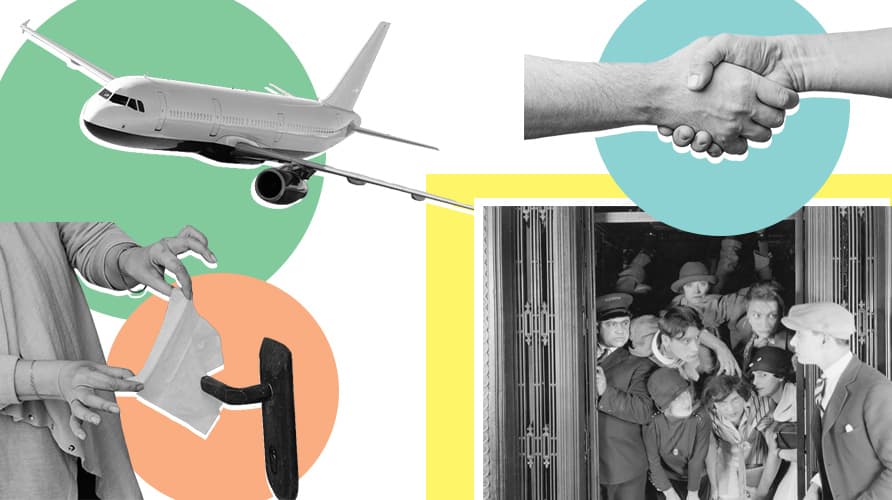
People who experience anxiety without a specific reason may be suffering from generalized anxiety disorder, or GAD. Though the onset of GAD can occur at any time from childhood to old age, the average onset is the early 20’s.
The exact cause of the disorder is not known, but genetic or gender factors may increase the risk. Sufferers feel anxiety on most days for six months or longer. In many instances, GAD can occur with other anxiety disorders, such as phobias, panic disorder, or post-traumatic stress disorder. (5)
Symptoms
Symptoms of generalized anxiety disorder may include:
- Fatigue
- Difficulty concentrating
- Restlessness, irritability
- Difficulty sleeping
- Headaches
- Muscle aches or tension
Diagnosis
To be diagnosed with GAD, an anxiety sufferer must meet the criteria listed in the Diagnostic and Statistical Manual of Mental Disorders, or the DSM-5. This criteria includes:
- Anxiety or worry over a period longer than six months
- The inability to manage these symptoms
- At least three of the following must occur (only one in children): restlessness, tires easily, trouble concentrating, irritability, muscle tension, problems with sleep
- Symptoms result in difficulty functioning
- Symptoms are not due to medications, drugs, or another health problem
- Symptoms are not better described by another psychiatric issue such as panic disorder
Treatment
Treatment options for GAD may include cognitive behavioral therapy, or CBT. CBT can help GAD sufferers identify harmful thoughts or behaviors and learn how to modify them. Medications such as benzodiazepines may be prescribed for short-term or occasional treatment. Antidepressants such as SSRIs may also be helpful. Natural treatments for GAD include meditation, yoga, aerobic exercise, and natural supplements like valerian root, lemon balm, and passionflower.
Obsessive-Compulsive Disorder
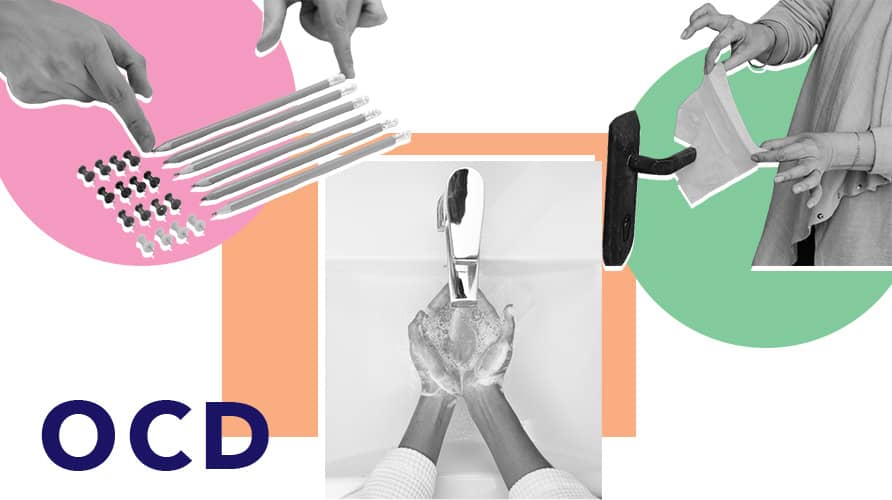
Obsessive compulsive disorder, or OCD, is characterized by a preoccupation with a particular thought or concern. OCD affects more than 2 million Americans, and may disproportionately impact people with other psychological issues, such as eating disorders or depression.
Symptoms
OCD sufferers may believe that something is unclean, unsafe, or disorganized. Signs of obsessive behavior include worry over whether the door is locked or the iron is unplugged, or a fear of becoming contaminated by items that others have touched. Some may feel stress that items are not neatly folded, lined up properly, or arranged correctly. (6)
People with OCD are generally unable to ignore their preoccupations or change their behavior without help. The disorder compels them to repeat an action in a ritualistic manner in an effort to resolve or eliminate the obsession. As a result, they may compulsively clean, divide things into even numbers, or organize items.
Signs of OCD include raw hands from repeated washings, repeated checking that a door is locked, or folding things in a specific way. The compulsion might temporarily relieve anxiety or give the sufferer a short-lived feeling of control. Though OCD sufferers often realize that their behavior is abnormal and causes them distress, they’re unable to stop. Though the majority of OCD cases involve both obsession and compulsion, some sufferers experience only one.
OCD affects both adults and children, and typically begins between the ages of 18 and 20. Some cases begin in early childhood. The disorder often interferes with work, school, and relationships. (7) Research suggests that OCD may be related to an imbalance in serotonin levels in the brain, and may have a genetic component.
Diagnosis
Diagnosis
DSM-5 diagnostic criteria for OCD include the following:
- Presence of obsessions, compulsions, or both
- Recurrent and persistent thoughts, urges, or images that are experienced, at some time during the disturbance, as intrusive and unwanted, and that in most individuals cause marked anxiety or distress
- The individual attempts to ignore or suppress such thoughts, urges, or images, or to neutralize them with some other thought or action
- Compulsions are defined as repetitive behaviors that the individual feels driven to perform in response to an obsession or according to rules that must be applied rigidly. The behaviors or mental acts are aimed at preventing or reducing anxiety or distress, or preventing some dreaded event or situation
- The obsessions or compulsions are time-consuming or cause clinically significant distress or impairment in social, occupational, or other important areas of functioning
- The obsessive-compulsive symptoms are not attributable to the physiological effects of a substance (e.g., a drug of abuse or medication) or another medical condition
- The disturbance can’t be explained by the symptoms of another mental disorder
Treatment
Exposure and response prevention, or ERP, is considered one of the most effective ways to treat the condition. (8) This method of treatment exposes the individual repeatedly to what is causing their obsession. When a patient begins to respond in a compulsive way, they are asked to actively resist until the feeling of anxiety begins to fade. Medication may or may not be used in conjunction with ERP.
Panic Disorder
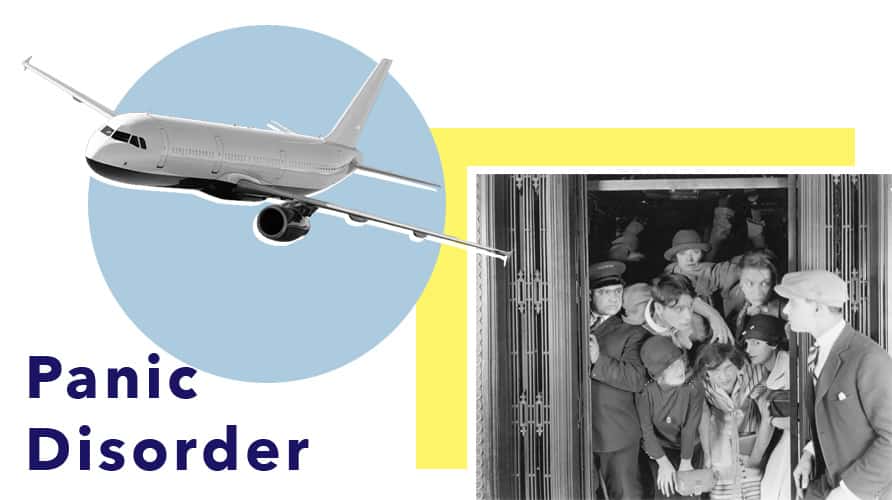
Panic disorder is characterized by sudden and extreme feelings of panic or terror. The terror of panic disorder is typically described as overwhelming, and causes extreme discomfort.
Symptoms
Common symptoms of panic disorder can include trembling, pain in the chest, lightheadedness, and a racing heart. It can also make breathing difficult, and the sufferer may feel dizzy or faint. (9) Symptoms usually peak about ten minutes after the episode begins. This sudden rush of intense terror is called a panic attack. Panic attacks that occur frequently are considered a panic disorder.
Panic disorder may lead to related issues, such as not leaving one’s home for fear of having a panic attack. Panic disorders occur more frequently in women than men and most often begin by the age of twenty-five. Panic disorder tends to run in families, but the exact cause remains unknown.
Diagnosis
DSM-5 criteria for diagnosis of panic disorder include:
- The individual experiences recurrent unexpected panic attacks, which are abrupt feelings of intense fear or discomfort that peak within minutes. During this time, at least four of the following symptoms occur:
- Palpitations or quickened heartbeat
- Abnormal sweating
- Trembling or shaking
- Instances of shortness of breath or feeling smothered
- Feelings of choking
- Chest pain or discomfort
- Nausea or abdominal pain
- Dizziness or faintness
- Chills or hot flashes
- Numbness or tingling
- Derealization (feelings of unreality) or depersonalization (feeling detached from the self)
- Fear of losing control or “going crazy”
- Fear of death
- One or more of the attacks are followed by a month (or longer) of one or both of the following: persistent worry about having more panic attacks and/or their consequences (e.g., having a heart attack), and/or significant abnormal change in behavior in response to the attacks, such as avoidance of unfamiliar situations
- The disturbance cannot be attributed to the physiological effects of a substance, such as a drug or medication, or another medical condition
- The disturbance cannot be better explained by another mental disorder, such as social anxiety disorder or a specific phobia which may involve panic attacks
Treatment
Typically, diagnosis of panic disorder involves a thorough examination, a medical history review, and an interview and evaluation by a mental health provider. The condition may be treated with the use of psychotherapy, relaxation techniques, cognitive behavioral therapy, and/or medication. Some resistant cases may require a multi-pronged treatment approach. (10)
Phobias
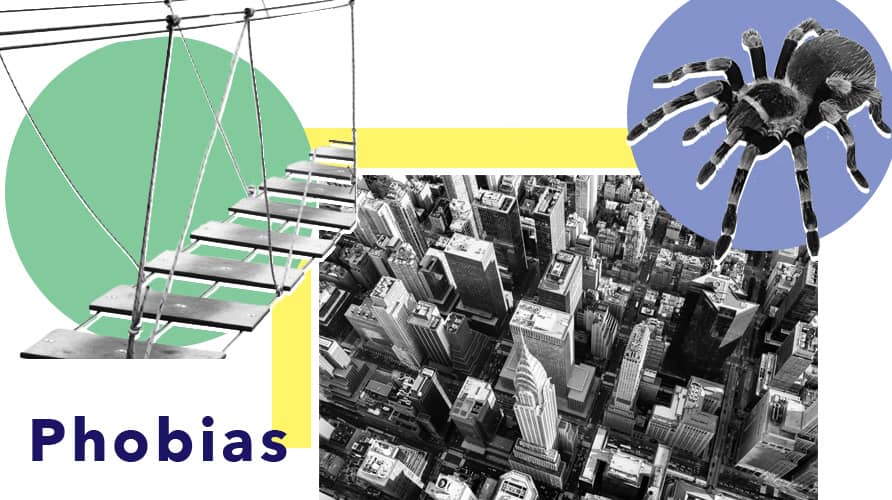
Phobias involve feelings of intense fear associated with certain objects, living things, or situations, such as dogs, small spaces, or being alone. This type of specific fear is known as a phobia, and it affects millions of Americans yearly. Onset can occur at any age and may be triggered genetics or a frightening experience with the object of the fear. (11)
Symptoms
Symptoms of phobias include a rapid heartbeat, profuse sweating, an overwhelming sense of anxiety, panic attacks, or an inability to control one’s muscles. Different phobias affect sufferers in different ways. A phobia can stop a sufferer from pursuing a particular career, traveling, or enjoying certain activities with family and friends.
Diagnosis
While there are no lab tests that can diagnose a phobia, a person must meet the DSM-5 criteria to be diagnosed with this condition. These criteria include:
- Marked fear or anxiety about a specific object or situation
- The phobic object or situation almost always provokes immediate fear or anxiety
- The phobic object or situation is avoided or endured with intense fear or anxiety
- The fear or anxiety is out of proportion to the actual danger posed by the specific object or situation
- The fear, anxiety, or avoidance is persistent, typically lasting for six months or more
- The fear, anxiety, or avoidance causes clinically significant distress or impairment in social, occupational, or other important areas of functioning
- The disturbance is not better explained by symptoms of another mental disorder, including fear, anxiety, and avoidance of situations associated with panic-like symptoms, reminders of traumatic events, or social situations
Treatment
Treatment might involve exposure therapy and cognitive behavioral therapy. (12) Medications may help on a short-term or situational basis, but are generally not a long-term solution for the disorder.
Post-Traumatic Stress Disorder

Often referred to as PTSD, post-traumatic stress disorder can occur after a person has experienced a life-threatening or traumatic event. Common causes of PTSD include rape or sexual assault, military combat, abuse, severe accidents, natural disasters, or terrorist attacks.
Symptoms
It isn’t abnormal for a person to suffer some form of emotional harm following a traumatic event, but the impact should lessen with time. Some people, however, may suffer from persistent symptoms such as flashbacks or nightmares, extreme anxiety, or reactions such as aggression, shame, or guilt. (13)
Other symptoms of the disorder include feelings of emotional numbness, hopelessness, and difficulty with close relationships. Onset can occur at any age, and must last for more than one month and interfere with daily functioning to be considered PTSD.
Diagnosis
Sufferers must also meet the DSM-5 criteria for the condition, which include the following:
- The person was exposed to: death, threatened death, actual or threatened serious injury, or actual or threatened sexual violence, through direct exposure, witnessing the trauma, learning that a relative or close friend was exposed to a trauma, or indirect exposure to details of the trauma, usually in the course of professional duties
- The traumatic event is persistently re-experienced through unwanted upsetting memories, nightmares, flashbacks, emotional distress after exposure to traumatic reminders, and/or physical reactivity after exposure to traumatic reminders
- Avoidance of trauma-related stimuli, including thoughts, feelings, or reminders
- Negative thoughts or feelings that began or worsened after the trauma, including the inability to recall key features of the trauma, overly negative thoughts and assumptions about oneself or the world, exaggerated blame of self or others for causing the trauma, decreased interest in activities, and feeling isolated
- Trauma-related arousal and reactivity that began or worsened after the trauma, including irritability or aggression, risky or destructive behavior, hypervigilance, difficulty concentrating, difficulty sleeping
Treatment
Treatment of PTSD may involve exposure therapy, eye movement desensitization and reprocessing (EMDR), cognitive behavioral therapy, and/or medication. Treatment may be prolonged, but can be quite effective at reducing symptoms and improving quality of life.
Social Phobia / Social Anxiety
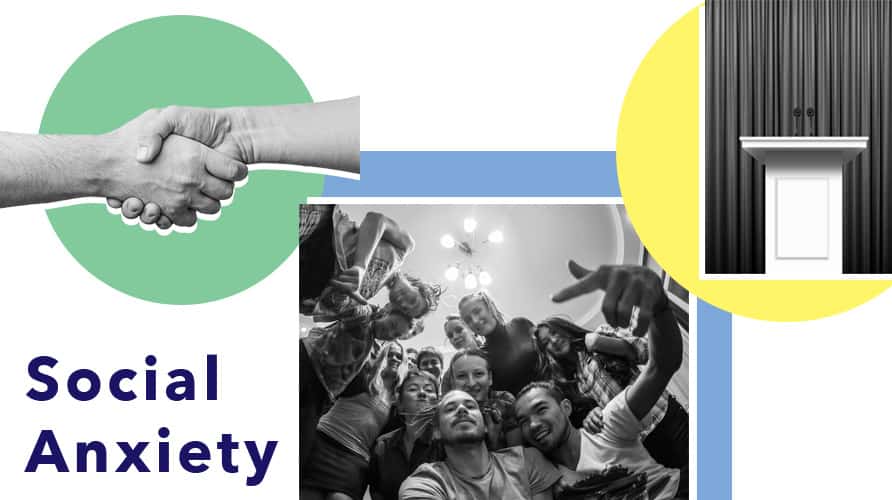
Social anxiety is characterized by excessive fear, distress, and anxiety in social situations or while speaking in public. (14) This type of anxiety can appear in the early teens, and may be caused by a negative social experience, fear of being embarrassed in front of others, or poor social skills. Genetics or a dysfunction of the fight-or-flight response may also contribute to the condition.
Symptoms
Despite awareness of the problem, people who suffer from social phobia are unable to overcome their anxiety and may avoid social activities entirely. Other symptoms include tensing of muscles, sweating, tremors or shaking, upset stomach, diarrhea, and even confusion. Symptoms may occur before or during work. school, or social events, or when anticipating meeting new people.
Diagnosis
DSM-5 criteria for diagnosis of social phobia or anxiety include:
- A persistent fear of one or more social or performance situations in which the person is exposed to unfamiliar people or to possible scrutiny. The individual fears that he or she will act in a way that will be embarrassing and humiliating
- Exposure to the feared situation provokes anxiety, which may take the form of a panic attack
- The person recognizes that the fear is unreasonable or excessive
- Feared situations are avoided or endured with intense anxiety and distress
- The avoidance, anxious anticipation, or distress interferes significantly with the person’s normal routine, occupational functioning, or social activities or relationships, or there is marked distress about having the phobia
- The fear, anxiety, or avoidance is persistent, typically lasting six or more months
- The fear or avoidance is not due to the direct physiological effects of a substance such as drugs or medications, or to another medical condition
Treatment
There are several potential methods of treating social anxiety disorder, including cognitive behavioral therapy and medications. In some cases, treatment may involve a combination of these options. Hypnosis may be an option for some people, along with alternative treatments such as guided imagery and relaxation exercises.
Anxiety and Sleep
The inability to sleep is one of the most common side effects experienced by people who suffer from anxiety. Sleep deprivation can affect mood regulation and psychological functioning, triggering or exacerbating anxiety. Poor sleep can also impact the ability to function at work or school, and increase the risk of vehicle and workplace accidents.
Anxiety can cause the nervous system to remain in an activated state, making relaxation difficult. (15) Levels of stress hormones such as cortisol and adrenaline can remain elevated, heart and breathing rates may increase, and muscles can be tense. Racing thoughts are common in anxiety sufferers who struggle to fall and stay asleep.
To help relieve anxiety symptoms and promote sleep, try the following tips:
- Keep a consistent sleep and wake schedule. Go to bed and wake up at the same time every night to regulate the circadian rhythm and establish a healthy sleep pattern
- Avoid caffeine, alcohol, and heavy meals before bed
- Harris recommends pushing your bedtime a bit later — if you’re not truly sleepy when you go to bed, it gives your mind more opportunity to head down anxious paths
- Forego naps. Napping can reduce the drive to sleep and make falling asleep more difficult
- Make bedtime a soothing experience. Relax for at least an hour before bed by reading, practicing light yoga, meditating, and switching off electronics. Electronics emit blue light, which can stop or reduce the release of melatonin, also called “the sleep hormone.” If you must use electronics, try wearing blue blocking glasses to minimize the amount of blue light that reaches your eyes
- Try the 4-7-8 breathing exercise. Also, known as “relaxing breath,” 4-7-8 breathing lets you focus on a soothing activity instead of thoughts that might keep you awake. 4-7-8 breathing involves inhaling for four seconds, holding your breath for seven seconds, exhaling for eight seconds, then repeating the process. This pattern of breathing can help reduce anxiety, relax the body, and make it easier to fall asleep
- Invest in a comfortable mattress and try a weighted blanket. Weighted blankets are designed to help reduce anxiety and increase feelings of security
- Exercise regularly. Consistent vigorous exercise can help reduce muscle tension, decrease levels of stress hormones, and increase levels of endorphins and other relaxing chemicals in the bloodstream
- If anxiety or other sleep issues persist, see a doctor or sleep specialist. Most sleep issues can be treated and/or dramatically improved with the right diagnosis and treatment
Last Word From Sleepopolis
Anxiety is one of the most common causes of sleep disturbance. Many cases of anxiety are temporary responses to life events or transitions. Some anxiety is more persistent, however, and can be classified as a distinct disorder. Proper diagnosis and treatment can help alleviate symptoms, including the sleep disruptions common to nearly every type of anxiety.
References
- R. McCarty, The Fight-or-Flight Response: A Cornerstone of Stress Research, Stress: Concepts, Cognition, Emotion, and Behavior, 2016
- Martin EI, Ressler KJ, Binder E, Nemeroff CB., The Neurobiology of Anxiety Disorders: Brain Imaging, Genetics, and Psychoneuroendocrinology, The Psychiatric Clinics of North America, September 2009
- Bystritsky A, Khalsa SS, Cameron ME, Schiffman J., Current Diagnosis and Treatment of Anxiety Disorders, P & T : a peer-reviewed journal for formulary management, January 2013
- Eric J. Lenze M.D. et al., The Association of Late-Life Depression and Anxiety With Physical Disability: A Review of the Literature and Prospectus for Future Research, The American Journal of Geriatric Psychiatry, Spring 2001
- Ayelet Meron Ruscio, Cross-sectional Comparison of the Epidemiology of DSM-5 Generalized Anxiety Disorder Across the Globe, JAMA Psychiatry, May 2017
- Pinto A, Mancebo MC, Eisen JL, Pagano ME, Rasmussen SA., The Brown Longitudinal Obsessive Compulsive Study: Clinical Features and Symptoms of the Sample at Intake, The Journal of Clinical Psychiatry, February 6, 2012
- Gerald Nestadt, A Family Study of Obsessive-compulsive Disorder, JAMA Psychiatry, April 2000
- Jürgen Hoyer, et al., Worry Exposure versus Applied Relaxation in the Treatment of Generalized Anxiety Disorder, Psychotherapy and Psychosomatics, February 11, 2009
- Kim YK., Panic Disorder: Current Research and Management Approaches, Psychiatry Investigation, January 2019
- Chen MH, Tsai SJ., Treatment-resistant panic disorder: clinical significance, concept and management, Progress in Neuro-psychopharmacology & Biological Psychiatry, October 2016
- Ollendick TH, Raishevich N, Davis TE 3rd, Sirbu C, Ost LG., Specific Phobia in Youth: Phenomenology and Psychological Characteristics, Behavioral Therapy, March 2010
- A Ghosh, Therapist Contact and Outcome of Self-exposure Treatment for Phobias: A Controlled Study, British Journal of Psychiatry, January 2, 2018
- Iribarren J, Prolo P, Neagos N, Chiappelli F., Post-Traumatic Stress Disorder: Evidence-Based Research for the Third Millennium, Evidence-Based Complementary and Alternative Medicine, December 2005
- C.Z Musa, Cognitive aspects of social phobia: a review of theories and experimental research, European Psychiatry, February 2000
- Pasquale K. Alvaro, et al., A Systematic Review Assessing Bidirectionality between Sleep Disturbances, Anxiety, and Depression, Sleep, July 2013
Subscribe Today!
Get the latest deals, discounts, reviews, and giveaways!

